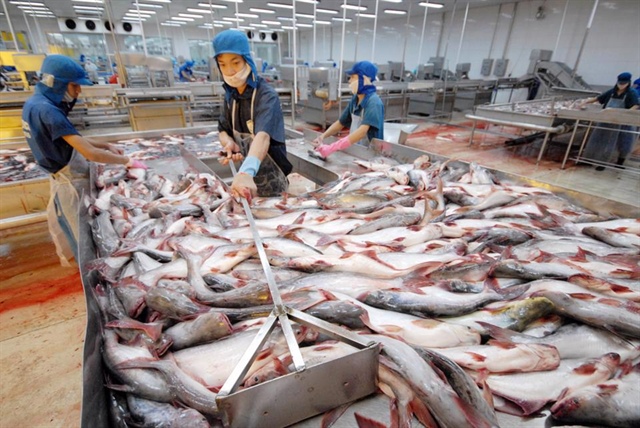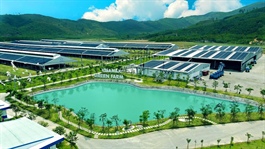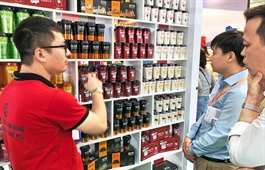Vietnam to realize export target ahead of schedule
Vietnam to realize export target ahead of schedule
The utilization of a diversified network of free trade agreements continues to support Vietnam’s trading performance despite the unfavorable global economic environment.
Vietnam’s exports during the 10 months rose by 16% year on year to US$312.82 billion, and is likely to realize the target of $368 billion ahead of schedule, according to the Department of Import-Export under the Ministry of Industry and Trade (MoIT).

Catfish exports have been on the rise thanks to high global demand. File photo |
“The results remain encouraging amid unfavorable global economic situation and show the strong efforts from both local authorities and companies,” stated the MoIT.
It is worth mentioning that during the 10 months, 32 categories of export products posted a turnover of over $1 billion, accounting for 92.8% of total exports.
A highlight was Vietnam’s catfish exports with a surge of 76.5% to over $2.1 billion. Given the rising demand in the next months, it is expected the export turnover in 2022 from catfish could reach a record high of $2.5-2.6 billion, a 1.5-fold increase against last year.
The garment sector also posted strong progress with a turnover of $38 billion in the 10 months, averaging 3.7-3.8 billion per month.
Vice President and General Secretary of Vietnam Textile and Apparel Association (VITAS) Truong Van Cam noted despite the slowing demand globally which is expected to last until the end of the fourth quarter, the target of $43-44 billion remains feasible for this year.
Vice General Director of the Import-Export Department Tran Thanh Hai said the country’s effective implementation of free trade agreements (FTAs), such as the EVFTA, CPTPP, and UKVFTA has been a key factor for the high performance, along with the rising market demand.
Hai, however, noted Vietnam’s trading activities would face major challenges, including high petrol prices, disruption of global supply chains, and economic recession.
“The uptrend of protectionism in countries around the world has also caused major impacts on the supply chains,” Hai said.
According to Hai, the rising inflation in many countries, especially Vietnam’s major markets, could lower demand for exports and further dampen the trade outlook.
Cam from VITAS said the rapid appreciation of the US dollar value would help Vietnamese garment firms gain a slight advantage, but to grasp this opportunity, Cam expected them to improve product quality and capacity to meet the technical specification of different markets.
Regarding exports of agro-forestry-fishery products, Vice Minister of Agricultural and Rural Development Phung Duc Tien noted rising complaints over rules of origin are becoming challenging for agricultural exports.
“The export target of $50 billion, however, stays unchanged,” Tien said, expecting higher demand for food products in markets around the world would be a major factor.
Hanoi expects strong export performance
In the 10 months, Hanoi’s exports stood at US$14 billion, up 13.6%, in which the domestic sector earned $7.4 billion, up 10.3%, and the foreign-invested sector reaped $6.6 billion, up 17.7%.
Export items that recorded strong growth in the January-October period were garments with $2.1 billion, up 21.6% year on year; computers and electronics products with $2 billion, up 22%; equipment with $1.66 billion, up 1.7%; petroleum products with $996 million, up 88.5%.
As Hanoi anticipates a strong end for its trading performance, it is planning for an export growth target of 6-8% for 2023.
To achieve this goal, Hanoi People’s Committee would carry out several key tasks, including support policies for local businesses to enhance their competitiveness and adaptability in the new context.
Hanoi would further push for administrative reform, including the application of IT in carrying out administrative formalities; facilitate production and exports in the coming time.
In addition, Hanoi would hold business-matching events to support local businesses in search of partners abroad, and provide training courses for the workforce to ensure sufficient supplies for the local market.






















